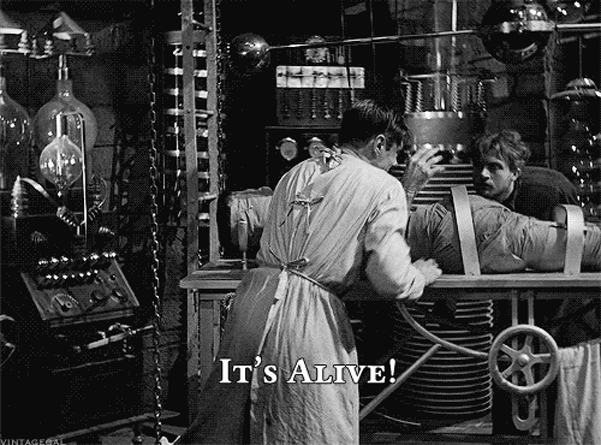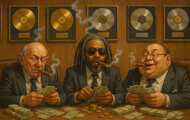For over forty years, Robert Plant has been dwarfed by the towering shadow of the rock singer he once was. The impact of Led Zeppelin shone so bright that the self-proclaimed golden god still basks in the protective glow of past glories.
In stark contrast to the days of honest music criticism that once characterized rock magazines like Rolling Stone, Melody Maker, and Creem, elder rock statesman Plant now enjoys a steady stream of acclaim and adulation from today’s obsequious journalists.
The woeful state of the today’s music industry is inversely proportional to the honesty of music journalism — or what’s left of it.
We live in an upside down world where actors, singers, celebrities, and big tech CEOs are the new aristocracy and access journalists are their dutiful publicists.
The ultimate purpose of authentic artistic critique is to improve both the artist and their art. Alas, today’s modern critics have abandoned any pretense of objectivity and like their counterparts in political journalism they have become liars, cheerleaders, and fanboys. They’ve traded their journalistic integrity for continued access to the elite. Showering undeserved praise on actors and musicians doesn’t help anyone and harms the artist and negatively affects the art.
In ancient Rome, various high level political officials had a slave called the Auriga whose sole purpose was to stand by his side and continually remind him the following:
Memento homo. Remember, you are only a man…
Celebrities and rock stars have no one to whisper this eternal truth into their ears. Elvis Presley had no one that dared to tell him the truth and he died far too young because of his ivory tower built by the bricks and mortar of his many excesses.
There’s another apt phrase that applies:
Never meet your heroes.
There is a lesson in this for fans and admirers: entertainers are only human. All the other heroic qualities that we impose on them are unrealistic. To expect Robert Plant as a human to live up to the majesty of his work with Led Zeppelin is also unrealistic.
Paradoxically, Plant’s biggest critic is himself. But Plant is not critical of his current, self-indulgent self. Instead, he reserves his criticism for his former persona, the lead singer of Led Zeppelin. The Black Country lad that rocked the word, is seemingly ashamed of the legacy of Led Zeppelin and the fans that still adore them.
Part of his ongoing penitential ritual is to lecture us about influential but obscure bluesmen as was the case at Q2 in 2007 for the one off Zeppelin reunion show. When he introduced Trampled Underfoot at Q2, professor Plant prattled on about Robert Johnson’s Terraplane Blues released in 1936. Perhaps this acknowledgement is his mea culpa because of the guilt he felt after coming to terms with Led Zeppelin’s shameless pillaging and repurposing of black American blues.
Instead of going forward and forging something new that he and his mates did with Zeppelin, Plant is now going backwards and exhuming the musical past of America in a fashion that would make documentarian Ken Burns proud.
With Plant’s current voice and his current songwriting abilities, he would be lucky to make a few bob street busking. It’s doubtful that he has the right vocal stuff to be admitted into a local church choir. Without the legacy of Led Zeppelin, and his current vocal state, he would be nothing.
The Plant of today churns out unremarkable, lugubrious, throwaway music. There’s nothing raw, risky, or groundbreaking about it. He plays it safe and hides behind the authenticity of esoteric American folk, country, and bluegrass. As he ambles about the stage like a constipated old hippy, he sounds more like Burl Ives on Valium than the explosive Robert Plant of old. There’s no energy or urgency in his droning voice. Without a passenger seat on the Jimmy Page, John Paul Jones, and John Bonham express, Plant’s new songs are forgettable pap.
A few years ago I read the transcript of an interview with Plant. Plant’s contemptuous attitude toward the fans shocked me:
“…when Jimmy Page and I traveled around the world with an Egyptian orchestra, playing – stuff, you know. It got to a point one night in Mannheim in Germany, where we were playing inside a big concrete cube to a huge audience of males pumping the air with their fists. And I went, ‘Well, I don’t think we need this anymore. It’s time to get off the bus quick.’”
This snippet reveals Plant has forgotten the rebellious nature of rock and roll and would prefer the sedate and snobby atmosphere of Ronnie’s Jazz Club in London where he has been spotted on a few occasions. More importantly, this pathetic whining from Plant demonstrates that he lacks any semblance of gratitude toward Led Zeppelin fans who weren’t alive or could not attend their live shows during their heyday. To denigrate fans just because they are enthusiastic, shows that Plant has become a detached, selfish, unpleasant, old curmudgeon that is unworthy of the adulation and wealth that he currently enjoys.
During the first 4 magical years of Led Zeppelin from 1968 – 1972 when the band was at it’s creative zenith, Plant’s vocals and lyrics exuded a wisdom beyond his years. Years later I finally realized why: he possessed an uncanny ability to channel and mimic the soul and heartache of those original black blues men into the Led Zeppelin sound. The entire British invasion was repurposed, modernized, electrified, and commodified black American blues.
Most musicians produce their best work at the start of their careers because success immunizes them from the pain that fuels great art — the trials and tribulations of everyday life that that the rest of us must endure. The very best musicians create art that is relatable to the ears of the beholder. Robert Plant has been out of touch with the hardships of life for regular folk for most of his adult life.
Without the genius of Jimmy Page and the rest of Led Zeppelin, Plant is a ever-dwindling shadow of his former self. Without his explosive voice — which gave him such a wide expressive palette — he is running on the stale fumes of past glories. Rumors abound that he abused his God given gift by failing to warm up his voice before shows, by chain smoking, and irresponsible behavior such as hitchhiking on a cold, clammy 1972 English night while he was suffering from influenza.
In a recent article, Plant admits he chided Joe Elliot for warming his voice up before Def Leppard shows. Plant’s failure to warm up his voice was clearly evident on the 1973 tour and beyond in numbers like Rock and Roll which opened up their show at Madison Square Gardens.
In the final years of Led Zeppelin, as they succumbed to the excesses of the rock star lifestyle and drifted away from being working class English lads, the band started to lose its creative edge and would resort to penning tunes about life on the road. Self-indulgent road tunes like Sick Again and Royal Orleans come to mind. Back in college, my music professor — a respected A & R guy from New York city — had harsh things to say about rock bands that ended up writing road songs about experiences on the road. I recall, he mentioned that working class audiences don’t relate well to narcisisstic road songs and the “hardships” of millionaire rock stars flying around the world in their own private jets.
During the punk years, I remember a puzzling story about an obnoxious new wave singer named Joe Jackson who revealed in a music magazine like Creem or Circus, that he hated his biggest hit “Sunday Papers”. He was so sick of it, he stopped playing it live. This was all part of the anti-hero, anti-star, anti-success zeitgeist of the time exemplified by bands like the Sex Pistols and others who “hated success” or so they claimed. Eventually John Lyndon AKA Johnny Rotten used his success to pay the bills and made a TV ad for butter.
Perhaps Plant is trying to tap into that punk anti-hero street cred sensibility.
For Plant, the realization that he will never come close to the artistic impact of his brief years with Led Zeppelin must gnaw away at him. His open contempt of the group’s rock transcendent masterpiece opus Stairway to Heaven is perplexing. Even though Stairway has brought joy to hundreds of millions of people, he says that he can’t relate to it today. Speaking of relatable music, I think millions of Zeppelin fans can’t relate to the reeking pile of fresh rubbish that Plant’s been putting out either. Right back at you Robert.
Strangely enough, Plant has no trouble relating to the $500 million that song has purportedly earned in publishing and performance royalties over the years. Plant is so appalled at Stairway to Heaven that he showed up in court and joined co-writer Jimmy Page to defend themselves for against claims of copyright infringement.
Using sheet music trickery, somehow Plant and Page prevailed, and they retained their copyright.
If Led Zeppelin had lost that lawsuit it would have been sweet poetic justice because they too sued for copyright infringement for the most frivolous of reasons. I remember in 1975, an obscure band called Little Roger and the Goosebumps mashed together a harmless parody sendup of Stairway to Heaven with the Gilligan’s Island theme song. What did Led Zeppelin do? They threatened to sue them for copyright infringement:
When the reformed Zeppelin played Stairway at the reunion benefit held at the Q2 stadium in 2007, it was obvious to all that Plant was going through the motions and his heart wasn’t in it. The youthful sense of joy of the song that once prompted him to preface the classic with “I think, this is a song of hope” and eluded him at the Q2.
The young Robert Plant of Led Zeppelin was a positive and likeable person. The cantankerous windbag of today — not so much. Maybe it’s the endless rain and gloom of the British Isles, that drains the joy out of the denizens of that sceptered isle. Whatever the reason, English men don’t seem to age very well.
It’s hard to be a fan of Led Zeppelin and know that the person that sang it and wrote the lyrics of Stairway to Heaven now despises his crowning masterpiece. For the sake of the fans, he should have exhibited some professionalism and adult restraint and kept his feelings to himself.
Both Led Zeppelin and Plant have never taken criticism kindly. I remember during the press conference of the release of the recent live Led Zeppelin album where a surly Plant called a reporter a schmuck for daring to ask if the release of the Celebration Day video and album was a sign of things to come.
While Plant distances himself from Led Zeppelin in interviews, he still can’t let Zeppelin go and and tortures fans by performing dismembered interpretations of Zep classics. His 1995 rendition of Down By the Seaside in a duet with Tori Amos is a musical atrocity with a gloomy and despondent vibe that would make Kurt Cobain blush. Sadly, nobody in his retinue has the stones to tell him this. Nobody in Elvis’s entourage had the courage either.
In a recent interview with former Sex Pistol’s guitarist Steve Jones, Plant ribbed Sting for rejecting his punk roots and morphing into a current day version of Frank Sinatra. Truth be told, Sting’s roots were in jazz and the Police jumped on the punk bandwagon at the time and the rest is history.
Say what you want about Sting’s bloated ego, at least he had the talent to back it up. He also forged his own solo sound and didn’t apologize for his work with the Police or virtue signal endlessly about all the pioneers of reggae music in Jamaica.
Instead of being embarrassed about Stairway to Heaven, Plant should be embarrassed about dying his hair blond, his silly 1970’s perms, and the fact that he wore women’s clothing during the 1973 and 1975 tours. Decades ago, when Esquire was a legit magazine and not the filthy communist rag it is today, a writer lampooned Plant for his poor fashion sense. Apparently, Plant allowed a groupie to do all his clothes shopping for him at women’s clothing boutiques in New York City. He should also be embarrassed that he allegedly slept with underage groupies and allegedly cheated on his wife while in tour with Zeppelin.
The entertainers of old were not saints but at least they were professionals. They realized that the fans paid to see them, and they dutifully performed all the expected hits without a hint of visible resentment. It would be inconceivable to go to a Frank Sinatra concert while he was alive without hearing him singing the iconic My Way. But not Robert Plant; he’ll never be caught dead singing Stairway to Heaven again if he can help it.
In a recent interview, he didn’t have kind words for the state of country music. I wonder what he thinks of the abysmal state of rock music. With all his countless millions, he could have started some kind of foundation to help preserve and promote rock music or opened up a Led Zeppelin Museum, but instead he’s chosen to run away from the genre he helped define and is busy playing bluegrass/folk on the Titanic and investing in the craft beer business.
At least country music stars are grateful to their fans. Gratitude is something that is not in the Robert Plant hymnal of virtues. I can’t remember a time where Plant ever bothered to thank his fans for making his amazing life possible. Repeated requests by the fans for a Led Zeppelin reunion tour have been quashed by one member in Led Zeppelin: his name is Robert Plant.
The universal joy that Led Zeppelin would give to millions of fans — both old and new — by way of a reunion tour is of no consequence to Plant. Like the statue of a Greek god, the unmoved singer remains oblivious to the petitions from his fans and is incapable of reciprocating the adulation of his admirers.
I think a big part of Plant’s problem is that having a net worth of $200 million has insulated him from the trials and tribulations of the common man. Plant will never have to worry about having enough money to pay medical bills. He’ll never have to worry about making a monthly mortgage payment. Plant has no idea of what it’s really like to work from 7 AM to 11 PM every night. I doubt he could handle a shift working in a coal mine let alone a shift at Starbucks from 7 AM to 11 AM like a normal bloke.
I have another theory. Like Dr. Frankenstein, maybe Plant regretted the monster that he helped unleash on the world. The 1980’s rise of vapid hair metal bands and various copycats were crude facsimiles of Zeppelin and probably annoyed him to no end.

In some ways, Plant is like chef Anthony Bourdain. In the later years of his life, Bourdain became jaded about his industry. Eventually, he abandoned his own cuisine and became enthralled with the novelty of foreign and regional cuisines as a sort of misguided penance for his success. Plant, who’s on a similar journey of self-flagellation, turned his back on Zeppelin’s musical bold alchemy of blues/folk/rock synergy, now dabbles with variants of low octane country, bluegrass, and folk music. Somehow, we’re all supposed to nod politely, smile, and enjoy what he does. I for one, do not.
Conclusion
As a massive Led Zeppelin fan, this is the article I never wanted to write. But, in a world that is drowning with lies, every now and then we need an occasional breath of honesty and tough unrequited love.
What Plant achieved with Led Zeppelin from 1969 to 1972 was a sonic miracle. Under the tutelage of Jimmy Page, Led Zeppelin broke all the rules and transcended the limitations of popular music with their eclectic sound. Even today, young teenagers frustrated by the monotony of today’s childish auto-tune “music” are gravitating to the timeless catalogue of Led Zeppelin.
The eclectic Led Zep had a profound impact on me as a lonely, alienated teenager. As well as widening my musical vocabulary, the English rock band’s music turned me on to the work of J.R.R. Tolkien.
In a world of overexposed celebrities, Plant and Zeppelin did another remarkable thing by nurturing a mystique about the band by limiting their public appearances, keeping their distance from the press, and rarely giving interviews. The unofficial 5th member of the band, their balls to the wall manager Peter Grant, revolutionized the rapacious music industry by negotiating favorable recording and touring contracts that were unheard of at the time.
Even as far back as 1970s, people like Cameron Crowe helped to create an unhealthy mythology about Led Zeppelin. In the years since, journalists, reviewers, critics, and even President Obama have been massaging his ego and allowing him to exist in a Fool’s Paradise of uncritical praise while willingly selling their souls for the privilege of being in the august presence of the once upon a time golden god.
As noted previously, the ancient Romans knew that constant, undeserved praise is not good for a person’s soul.
Ever since the demise of the band, the creative and culture ethos of Led Zeppelin has taken on a life of its own and has far eclipsed the human limitations of the band members. I only wish that instead of being ashamed of it, Plant would have embraced it. The expectation of occasional expressions of gratitude to the fans who have made his amazing journey possible is not too much to ask.
Your penance is over Robert Anthony. Please come home.





Another great article. I love your writing style. As a big fan of Zeppelin especially in my teenage years it’s disappointing but not surprising Robert Plant has become “woke”. I notice the same thing with Roger Waters, although a part of me wonders whether he was ever really a nice guy. It’s classic artists who get rich off the system they spend the rest of their lives ripping on it. I would like to see examples of the ones who haven’t changed. I know they are out there.
Thanks for the kind comments!
It’s very sad what has happened to Robert Plant. Even sadder is his contempt for the fans of his earlier work in Zeppelin. For years he’s been allowed to get away with it because of a generation of fawning journalists.
I’ve got an article in the works about the miserable state of music where I point most of the blame at woke critics.